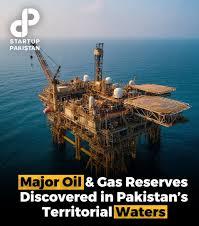Large oil and gas deposit discovered in Pakistani waters
4 min read
A geographic survey has successfully pinpointed the locations of the deposits, with relevant departments notifying the government about the findings in Pakistan’s maritime territory. Pakistan has discovered a substantial deposit of petroleum and natural gas within its territorial waters, a discovery that could significantly alter the country’s economic landscape. Reports from DawnNewsTV indicate that this discovery follows a comprehensive three-year survey conducted in partnership with an allied nation to verify these valuable resources’ presence. According to a senior security official, the geographic survey has successfully pinpointed the locations of the deposits, with relevant departments notifying the government about the findings in Pakistan’s maritime territory. The official described the initiative as a strategic move to leverage the ‘blue water economy’ and indicated that proposals for bidding and exploration are currently under review, suggesting that exploration activities may commence shortly. Despite the promising news, the official cautioned that drilling and extracting oil could take several years. Beyond oil and gas, he highlighted the potential for uncovering additional valuable minerals and elements from the ocean, emphasising the importance of swift action to capitalise on this opportunity. Initial estimates suggest that this discovery could represent the fourth-largest oil and gas reserves globally. Currently, Venezuela holds the position for the largest oil reserves, estimated at approximately 3.4 billion barrels, while the United States leads in untapped shale oil reserves. The top five include Saudi Arabia, Iran, Canada, and Iraq. Speaking with DawnNewsTV, former member of the Oil and Gas Regulatory Authority (Ogra) Muhammad Arif expressed cautious optimism regarding the findings. He acknowledged that while the discovery is promising, the expectation of finding reserves as projected is not guaranteed. “Whether these reserves can meet the country’s energy demands depends on their size and recovery rate,” he noted. Arif suggested that gas reserves could potentially replace liquefied natural gas (LNG) imports, and oil reserves might substitute for imported oil. Nevertheless, he warned that it remains “wishful thinking” until thorough reserves analyses are completed and drilling operations begin. He also pointed out that exploration requires a significant investment of around $5 billion and could take four to five years to yield results from an offshore site. Should exploration confirm the presence of reserves, additional investments would be necessary to develop wells and establish the infrastructure needed for extraction and fuel production, as reported by DawnNewsTV. Large Oil and Gas Deposit Discovered in Pakistani Waters a significant oil and gas deposit has been discovered in Pakistani waters, marking a potential economic game-changer. This discovery, confirmed after a three-year survey, could drastically alter Pakistan’s energy landscape. The survey was conducted in collaboration with a friendly nation, ensuring thorough and accurate results. Experts believe this deposit could be one of the largest in the world. The discovery has sparked optimism about Pakistan’s economic future, given its potential to reduce energy imports. Currently, Pakistan relies heavily on imported oil and gas to meet its energy needs. This dependency has strained the country’s foreign exchange reserves and economic stability. The new deposit could significantly alleviate these pressures by providing a domestic energy source. However, the journey from discovery to extraction is complex and costly. Initial estimates suggest that exploration alone could require a $5 billion investment. The process of drilling and extracting the oil and gas could take several years. Despite these challenges, the potential benefits make the investment worthwhile. The discovery is part of Pakistan’s broader “blue economy” strategy, which focuses on marine resources. This strategy aims to harness the economic potential of the country’s vast maritime territory. The oil and gas deposit is a significant milestone in this strategy, highlighting the untapped potential of Pakistan’s waters. Former officials have cautioned that while the discovery is promising, it remains speculative until drilling begins. The actual size and quality of the reserves will only be confirmed through detailed exploration. This caution is necessary to manage expectations and ensure realistic planning. The government is currently evaluating proposals for bidding on the exploration rights. This process will determine which companies will be involved in the extraction efforts. The selection of experienced and capable companies is crucial for the success of the project. If successful, the extraction of these reserves could have far-reaching economic impacts. It could reduce Pakistan’s reliance on imported energy, saving valuable foreign exchange. Additionally, it could create jobs and stimulate economic growth in related sectors. The discovery also has geopolitical implications, potentially enhancing Pakistan’s strategic importance. As a major energy producer, Pakistan could play a more significant role in regional energy dynamics. This could strengthen its position in international negotiations and alliances. However, the environmental impact of the extraction process must be carefully managed. Offshore drilling poses risks to marine ecosystems and coastal communities. Strict environmental regulations and monitoring will be essential to mitigate these risks. The government has emphasized the need for swift action to capitalize on this opportunity. You can read more Here. Delays in the exploration and extraction process could result in missed economic benefits. Therefore, a coordinated and efficient approach is necessary to realize the full potential of the discovery. In conclusion, the discovery of a large oil and gas deposit in Pakistani waters is a significant development. It offers the potential for economic growth, energy security, and geopolitical advantages. However, realizing these benefits will require substantial investment, careful planning, and effective management. The journey from discovery to extraction is long and complex, but the potential rewards make it a worthwhile endeavor. This discovery underscores the importance of exploring and harnessing Pakistan’s natural resources. It highlights the untapped potential of the country’s maritime territory and the opportunities it offers. With the right approach, this discovery could mark the beginning of a new era in Pakistan’s energy landscape.





